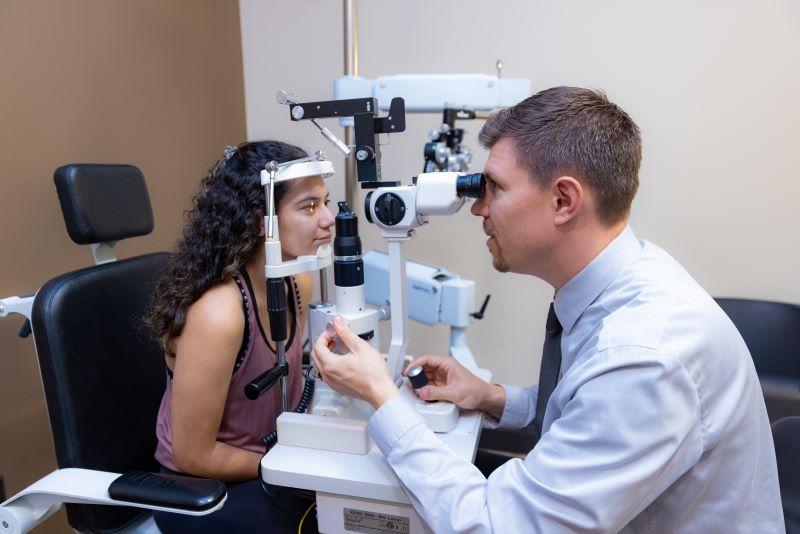 Age-related macular degeneration (AMD) is a progressive eye condition that affects the macula, a small area near the center of the retina responsible for sharp, central vision. At Colorado Optometry, we specialize in diagnosing and managing AMD to preserve our patients’ vision and quality of life.
Age-related macular degeneration (AMD) is a progressive eye condition that affects the macula, a small area near the center of the retina responsible for sharp, central vision. At Colorado Optometry, we specialize in diagnosing and managing AMD to preserve our patients’ vision and quality of life.
Causes of Age-Related Macular Degeneration
AMD may result from a combination of genetic, environmental, and lifestyle factors, including:
- Age: Advanced age is the primary risk factor for AMD, with incidence increasing significantly after the age of 50.
- Genetics: Family history of AMD can increase the likelihood of developing the condition.
- Smoking: Tobacco use is a significant modifiable risk factor for AMD progression.
- UV Exposure: Prolonged exposure to ultraviolet (UV) light may contribute to retinal damage and AMD development.
Types of AMD
AMD is classified into two main types:
- Dry AMD: Characterized by the accumulation of drusen (yellow deposits) in the macula, resulting in gradual vision loss.
- Wet AMD: Involves abnormal blood vessel growth beneath the retina, leading to rapid and severe vision loss if left untreated.
Symptoms of Age-Related Macular Degeneration
Common symptoms of AMD include:
- Blurred or distorted central vision
- Difficulty reading or recognizing faces
- Dark or empty areas in the central visual field (scotomas)
- Reduced color perception
- Visual hallucinations (less common)
Diagnosis and Management
Diagnosing AMD involves a comprehensive eye examination, including:
- Visual acuity testing
- Dilated eye examination to evaluate the retina and macula
- Optical coherence tomography (OCT) to assess retinal thickness and integrity
- Fluorescein angiography to detect abnormal blood vessel growth in wet AMD
Treatment Options
Management of AMD aims to slow disease progression and preserve remaining vision. Treatment options may include:
- Supplements: using the proper supplement can make a large difference in slowing and possibly preventing further progression of macular degeneration. Some supplements have even shown evidence of reversal of macular degeneration in certain cases. Please know that most supplements commercially available have very little effect on slowing macular degeneration..
- Anti-VEGF Therapy: Intravitreal injections of anti-vascular endothelial growth factor (VEGF) medications can inhibit abnormal blood vessel growth in wet AMD.
- Laser Therapy: Photodynamic therapy (PDT) or laser photocoagulation may be used to target and seal leaking blood vessels in wet AMD.
Lifestyle Modifications
Patients with AMD can benefit from adopting healthy lifestyle habits to support ocular health, including:
- Smoking cessation
- A balanced diet rich in green leafy vegetables, fish, and omega-3 fatty acids
- UV protection with sunglasses and hats
Ongoing Monitoring and Support
Regular follow-up visits with your optometrist at Colorado Optometry are essential to monitor AMD progression, adjust treatment plans as needed, and provide low-vision rehabilitation resources if central vision loss occurs.
Conclusion
Understanding the causes, symptoms, and treatment options for age-related macular degeneration is crucial for preserving vision and maintaining ocular health. If you have concerns about AMD or notice changes in your central vision, contact Colorado Optometry to schedule a comprehensive eye evaluation. Our dedicated team is committed to providing personalized care and innovative treatments to enhance your visual wellness and quality of life.






